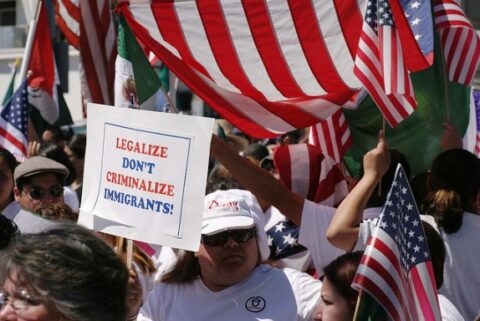Immigration Reform

Celebrating a Legislative Victory for Refugees and Religious Freedom
Iranian Jewish men pray during Hanukkah celebrations at the Yousefabad Synagogue in Tehran, Iran. BY MELANIE NEZER, HEBREW IMMIGRANT AID SOCIETY (HIAS) Tucked into the fiscal year 2012 spending bill the President signed before the holidays was an extension of a provision known as the “Lautenberg Amendment.” The inclusion of the extension is good news for refugees seeking religious freedom at a time when Congress has deadlocked on immigration issues and legislative victories are few and far between. Read More

Value Added: Immigrants Create Jobs and Businesses, Boost Wages of Native-Born Workers
Immigrants are not the cause of unemployment in the United States. Empirical research has demonstrated repeatedly that there is no correlation between immigration and unemployment. In fact, immigrants—including the unauthorized—create jobs through their purchasing power and their entrepreneurship, buying goods and services from U.S. businesses and creating their own businesses, both of which sustain U.S. jobs. The presence of new immigrant workers and consumers in an area also spurs the expansion of businesses, which creates new jobs. In addition, immigrants and native-born workers are usually not competing in the same job markets because they tend to have different levels of education, work in different occupations, specialize in different tasks, and live in different places. Because they complement each other in the labor market rather than compete, immigrants increase the productivity—and the wages—of native-born workers. In the words of economist Giovanni Peri, “immigrants expand the U.S. economy’s productive capacity, stimulate investment, and promote specialization that in the long run boosts productivity,” and “there is no evidence that these effects take place at the expense of jobs for workers born in the United States.” Read More

New Reports Track Devastating Impact of Alabama’s Extreme Immigration Law on Residents
Despite recent court decisions and interpretations from the state’s Attorney General that limit implementation of Alabama’s draconian immigration law, HB 56, much of damage has already been done. Two recent reports by Human Rights Watch (HRW) and the AFL-CIO further illustrate the ways in which HB 56 is complicating many aspects of daily life. Both organizations sent delegations to Alabama to interview a wide variety of Alabama residents and found that the fallout goes well beyond the official implementation of the law’s provisions and extends to personal relationships. Both found that the law is just one part of an agenda to deny people fundamental rights. Read More

Just in Time for the Holidays: Congress Moves 4 Million Children Closer to Poverty
Congress has been unable to pass any meaningful immigration legislation this year, but the House couldn’t miss a chance to stick it to immigrants by going after their U.S. citizen children in a recent tax bill. While Americans are debating whether taxes on millionaires should be raised, the House, at least, is planning to raise taxes on the most vulnerable of American citizens. Read More

New Report Shows Immigrant Women Entrepreneurs Create Jobs and Contribute to Economy
Economists readily acknowledge the economic contributions of immigrant entrepreneurs to the U.S. After all, we wouldn’t have one-quarter of all public companies in the U.S.—companies like Google, Yahoo!, and Intel which employed 220,000 people and generated more than $500 billion in one year—without them. But lost in that acknowledgement are the contributions of immigrant women entrepreneurs who last year made up 40% (or 980,575) of all immigrant business owners in the U.S. This week, a new report, Our American Immigrant Entrepreneurs: The Women, takes a closer look at these women and examines the obstacles and pathways to establishing successful businesses—businesses that have created American jobs and generated millions in taxable revenue. Read More

New Report Challenges Notion that Harsh Enforcement Measures Drive Unauthorized Immigrants Out
Last week, a new report released by the Pew Hispanic Center found that nearly two-thirds of all unauthorized adult immigrants currently living in the U.S. (10.2 million) have been here for at least 10 years and nearly half of them (4.7 million) are parents of minor children. The longevity of their U.S. residency and pattern of parenthood suggest that these unauthorized immigrants are integrated into American society, challenging the notion that ramped-up enforcement measures like Arizona’s SB 1070 and Alabama’s HB 56 are effectively driving unauthorized immigrants back to their countries of origin. Read More

American Innovation Takes on Broken U.S. Immigration System
In the past several days news reports have depicted good old American ingenuity taking on our broken and outdated immigration system. CNN ran a story last week from Georgia about a handful of educators who have taken matters into their own hands after the state’s Board of Regents passed an extreme law in 2010 banning undocumented immigrant children from attending Georgia’s top public colleges and universities—banned despite the fact that these kids pay three times the rate of other in-state students due to their immigration status. Read More

Alabama’s Immigration Law Digs Deeper Hole for State Economy
Although some Alabama lawmakers credit the state’s overall drop in unemployment to their new immigration law (HB 56), the reality is that many industries and sectors in the state are losing workers and jobs. This week, the Birmingham News reported that Alabama’s construction industry is losing jobs faster than nearly any other state—a loss experts say is due in part to HB 56’s draconian provisions. To make matters worse, Alabama’s crackdown on those who look or sound foreign (a Honda employee stopped this week and the arrest of a Mercedes executive last week) is causing many to fear Alabama’s anti-immigrant reputation will detract foreign investors from doing business in the state. In fact, according to the Tuscaloosa News, “the law is becoming the greatest threat to the state’s economy and job creation, overshadowing even the record-setting bankruptcy of Jefferson County.” Read More

Children of Immigrant Entrepreneurs Excel Educationally, Report Finds
The contributions of immigrant entrepreneurs—innovation, job creation and economic growth—are often cited by economists as strong reasons to reform our outdated immigration system. However, the kids of immigrant entrepreneurs receive relatively little attention. Delving into the experiences of these adult children of immigrants provides a new lens through which to witness the struggles and triumphs of parents and their children as they pursue the American Dream. Read More

Report Debunks Myth that High-Skilled Immigrants Steal American Jobs
It is an article of faith among anti-immigrant activists that immigration results in fewer jobs and lower wages for native-born workers. For instance, the Federation for American Immigration Reform (FAIR) recently released a report in which it claims that native-born workers with science and engineering (S&E) degrees are being driven en masse into non-S&E occupations due to competition from foreign-born workers willing to accept lower wages. However, in its rush to blame immigrants, FAIR misses a highly salient detail: a growing number of jobs in non-S&E occupations require or reward S&E skills. In other words, native-born workers with S&E degrees aren’t being driven out of S&E occupations by immigrants; they are being lured into non-S&E occupations where their S&E skills are in high demand and command higher salaries. Read More
Make a contribution
Make a direct impact on the lives of immigrants.
